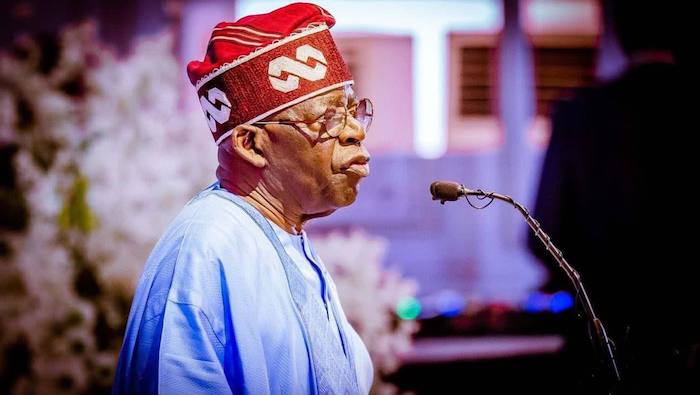Latest fuel price hike uncalled for, unacceptable
President Bola Ahmed Tinubu’s signature slogan of taking bold decisions in order to rescue the country does not appear to be working properly. It has pressed the people deeper and deeper into unnecessary misery. In the atmosphere of the putative courageous decisions, the government seems to have grossly abdicated its responsibility of promoting the welfare […]

tinubu
President Bola Ahmed Tinubu’s signature slogan of taking bold decisions in order to rescue the country does not appear to be working properly. It has pressed the people deeper and deeper into unnecessary misery. In the atmosphere of the putative courageous decisions, the government seems to have grossly abdicated its responsibility of promoting the welfare of the people, and thereby subjected Nigerians to harsh and incessant increases in the price of petroleum products under the guise of the total removal of fuel subsidy.
From Socialist to modern Capitalist countries, there is no nation where the price of Premium Motor Spirit (PMS) has been increased at the rate of about 430 per cent, as it was done in Nigeria, in less than two years.
In May 2023, when Tinubu was sworn-in as president, a litre of fuel was N196. But as of today, it is sold at N1,100 officially, an increase of close to N1,000. Nowhere in the world, even in war-torn countries, is the price of an item that is central to the economy and welfare of the people jerked up far beyond the rate of inflation. This could perhaps have happened in Fascist States where the people do not matter, where everyone and everything, including the welfare of citizens must be sacrificed in the interest of the State. But Nigeria is not a Fascist State; it is a democratic state whose constitution is more Welfarist than Capitalist and clearly prioritises the survival, welfare and security of the people over and above other considerations.
The Vice President, Kashim Shettima, at the recent National Economic Summit, coldly explained away the people’s suffering by claiming that there was no alternative to inflicting more suffering on Nigerians. But that was half-truth. The Tinubu administration has failed to interrogate all the World Bank and the International Monetary Fund (IMF) prescriptions for the country’s economic survival. This government has implemented them, hook, line and sinker, disregarding the unbearable pains they inflict on the people.
The comprehensive removal of fuel subsidy, without the provision of cheap transportation, like railway, trams, metro and mass transit buses, is a clear case of abdication of responsibility by the government. In countries where fuel is not subsidised, the majority of the people must not necessarily use PMS-powered vehicles for transportation. This government has promised to make Compressed Natural Gas (CNG) buses and kits available. But this cannot be realised in the immediate term, as CNG gas stations are not available in many parts of Nigeria. The devaluation of the Naira, in the name of allowing the currency to float, has worsened the purchasing power of the people. Again, there is hardly any State that allows its currency to float and lose value in this manner. It seems that the president’s economic team does not have an original economic strategy to liberate the country out of its predicaments; it allows the Bretton Wood institutions to lead Nigeria by the nose glaringly into Golgotha.
For more than three decades, the removal of subsidy on petroleum products has been on the table of each and every government. However, due to the lack of the culture of long-term planning, little was done to achieve it. Nigerians were told that corruption had contaminated the subsidy regime. The governments, instead of sanitising the system, allowed corruption to fester on to the benefit of a few, who are most times cronies of those in government. Our economists argued that PMS will become affordable if the country ramps up local refining of petroleum. This was not achieved, in spite of the sum of $25 billion sunk into the Turn-Around-Maintenance (TAM) of the four refineries, and the major work being done at the Port Harcourt Refinery. The billions of dollars poured into the petroleum depots across the country have also gone down the drain; fuel is being transported by articulated vehicles instead of through pipes into the depots. Yet, the top civil and public servants who failed Nigerians are not being held to account.
The recent and arbitrary increase in the price of PMS is uncalled for, unacceptable, and unaffordable. The hike affects not only petroleum products, it hurts and makes life difficult for Nigerians in all ramifications: food, education, health, and business activities. The living condition in Nigeria does not align with the ‘Renewed Hope’ slogan of the Tinubu government. It bears repetition here that the primary function of the State is to ensure the protection of its citizens from harsh living conditions. It is for this reason that those voted into power to run the systems harvest the natural resources of the State, collect taxes, and are empowered through the army and other security agencies to ensure law and order. The government cannot abandon the people to the adversity created by its seeming not-well-thought out economic measures. The least this government should do at the moment, as the main agency of the Nigerian State, is to intervene and bring down the price of PMS and those of other petroleum products.
The recent call by the House of Representatives to this effect is apt.
The federal government must act now to save the citizens that are suffocating.
